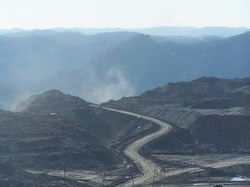Mountaintop removal mining study will test Obama's commitment to science
 Just days after the Environmental Protection Agency approved the expansion of a massive mountaintop removal mine in West Virginia, a dozen prominent scientists published a landmark study documenting the severe environmental and human health damage caused by the practice -- and called on the government to impose a moratorium.
Just days after the Environmental Protection Agency approved the expansion of a massive mountaintop removal mine in West Virginia, a dozen prominent scientists published a landmark study documenting the severe environmental and human health damage caused by the practice -- and called on the government to impose a moratorium.The findings will test the Obama administration's stated commitment to basing policy on science instead of politics.
Titled "Mountaintop Mining Consequences," the study by some of the nation's leading environmental scientists appeared in the Jan. 8 issue of the journal Science. It takes a broad look at the impacts of the practice, which involves clearing upper-elevation forests, stripping the topsoil, and blasting the rock with explosives to get to the coal below. The resulting waste is pushed into the valleys, burying headwater streams.
The researchers found that mountaintop removal mining operators have destroyed around 500 peaks in West Virginia, Virginia and Kentucky, and about 2,000 miles of streams. They also found that efforts to restore the damaged sites have not prevented metals and other contaminants from moving into waters downstream. The study documents deformities found in young fish in water contaminated by mountaintop removal mine runoff -- as well as higher disease and mortality rates in the coal fields' human residents.
"Mining permits are being issued despite the preponderance of scientific evidence that impacts are pervasive and irreversible and that mitigation cannot compensate for losses," the study says. "Considering environmental impacts of [mountaintop mining with valley fills], in combination with evidence that the health of people living in surface-mining regions of the central Appalachians may be compromised by mining activities, we conclude that MTM/VF permits should not be granted unless new methods can be subjected to rigorous peer-review and shown to remedy these problems."
The authors include Emily Bernhardt, a biologist with Duke University's Nicholas School of the Environment in Durham, N.C.; Dennis Lemly, U.S. Forest Service research biologist at Wake Forest University in Winston-Salem, N.C.; plant biologist Peter White of the University of North Carolina at Chapel Hill; Michael Hendryx with West Virginia University's Department of Community Medicine; and William Schlesinger, the former dean of Duke's Nicholas School who's now with the Cary Institute of Ecosystem Studies in Millbrook, N.Y.
The study appeared just three days after the Obama administration announced a deal allowing Missouri-based Patriot Coal to move forward with a plan to expand its Hobet 45 mine in Lincoln County, W.Va., one of that state's biggest mining operations. The permit the EPA issued for the operation under the Clean Water Act will allow the company to bury more than 3 miles of streams -- about half of what the company originally asked for permission to destroy.
That compromise approach may be smart politics on the part of the Obama administration: The Hobet 45 operation is expected to employ several hundred members of the United Mine Workers of America, which endorsed Obama for president. Permitting the operation preserves those jobs and avoids angering the UMWA and the West Virginia congressional delegation.
But during his campaign, Obama promised that his administration would make policy decisions based on sound science -- not on politics.
"Barack Obama and Joe Biden understand that critical national goals can only be met if we renew our commitment to science, technology and innovation," the candidates said in their campaign's science plan [pdf]. "We need to end the Bush administration's war on science where ideology trumps scientific inquiry and politics replaces expert opinion."
The Alliance for Appalachia, a coalition of environmental and other advocacy groups working in the region, is asking supporters to contact the White House and urge President Obama "to stop making excuses and use his authority to end Mountaintop Removal Coal Mining today."
(Photo of mountaintop removal site from Wikimedia Commons.)
Tags
Sue Sturgis
Sue is the former editorial director of Facing South and the Institute for Southern Studies.
